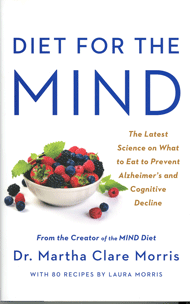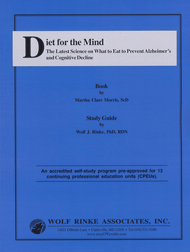Diet for the Mind
The Latest Science on What to Eat to Prevent Alzheimer’s and Cognitive Decline
| C334 |
12 CPEUs |
HARD COPY |
$109.95 |
|
The creator of the MIND diet provides a science-based guide to eating for a healthy brain, optimal cognitive function, and a reduced risk of Alzheimer's disease. More specifically you will be able to:
- Recommend nutrients, foods and lifestyle factors that have been shown to lower the risk of Alzheimer’s.
- Recognize specific brain pathologies typical of Alzheimer’s disease and their causative factors.
- Help clients better understand how advanced glycation end products (AGEs) impact their brain health and what to do to minimize them.
- Recommend specific food groups and quantities of foods to achieve brain health.
Share with a friend and Save! Click here for important information about
sharing.
To order an ADDITIONAL Reporting Form click below:
C334F |
12 CPEUs |
REPORTING FORM |
$50.00 |
|
Diet for the Mind
The Latest Science on What to Eat to Prevent Alzheimer’s and Cognitive Decline
C© 2024 Wolf Rinke Associates. All rights reserved for this self-directed accredited learning activity. Reproduction in whole or part without written permission, except for brief excerpts, is prohibited.
LEARNING OBJECTIVES
Upon completion of this CPE program you will be better able to:
- Recall how many people are affected by Alzheimer’s in the United States.
- Recognize the risk factors associated with Alzheimer’s disease.
- Explain the benefits of the MIND diet to clients.
- Recommend nutrients, foods and lifestyle factors that have been shown to lower the risk of Alzheimer’s.
- Communicate current research findings regarding dementia and Alzheimer’s to clients.
- Explain the different types of dementia to clients.
- Help clients recognize what may cause dementia-like symptoms.
- Identify the defining clinical characteristic of Alzheimer’s disease.
- Recognize specific brain pathologies typical of Alzheimer’s disease and their causative factors.
- Explain what causes the brain to be particularly vulnerable to damage.
- Recommend nutrients to reduce inflammation and atherosclerosis.
- Recommend specific foods that are known to contribute to brain health.
- Recommend food groups and quantities of foods that should be eaten every day, and those that should be eaten every week on the MIND diet.
- Explain which foods confer extra protection for the brain.
- Apply findings from research to help clients enhance their brain health.
- Help clients plan meals which promote brain health.
- Recommend specific foods that should be avoided on the MIND diet.
- Explain what oils are best to use for specific purposes.
- Debunk the claim that fresh vegetables are always the best for you.
- Recognize what other diets are similar to the MIND diet.
- Explain which studies have shown promising results for lowering the risk of Alzheimer’s disease.
- Identify specific dietary components of healthy and unhealthy foods of the MIND diet.
- Help clients better understand how advanced glycation end products (AGEs) impact their brain health and what to do to minimize them.
- Teach clients how to improve their brain health through nutrition and other lifestyle factors.
ABOUT THE AUTHOR OF THE BOOK
Dr. Martha Clare Morris is the Assistant Provost for Community Research and the Director of the Rush Institute for Healthy Aging and the MIND Center for Brain Health at Rush University in Chicago. She received her doctorate in epidemiology from the Harvard T.H. Chan School of Public Health and is the Principal Investigator of multiple studies that investigate dietary risk factors for the development of Alzheimer's disease, cognitive decline, and other common chronic conditions of older people.
ABOUT THE AUTHOR OF THE STUDY GUIDE
Wolf J. Rinke, PhD, RDN is the president and founder of Wolf Rinke Associates, a company that has provided high-quality CPE programs to nutrition and dietetics practitioners since 1990.
He earned a BS degree at Drexel University, an MS at Iowa State University, a PhD in Continuing and Vocational Education (Adult Ed) at the University of Wisconsin, and interned at Walter Reed Army Medical Center. He successfully completed a CPE item writing workshop sponsored by the Commission on Dietetic Registration (CDR).
Wolf is a past Adjunct Associate Professor, Graduate School of Management & Technology, University of Maryland, and a former Adjunct Faculty Member, School of Continuing Studies, The Johns Hopkins University.
He is the past president of the DC Dietetic Association and has been honored by the Academy with the Award for Excellence in the practice of Management; the Outstanding Dietitian of the Year Award; the Outstanding Service Award; and has delivered the Lenna Frances Cooper Lecture.
At the Academy he has served in numerous leadership roles including Chair, Scholarship Committee, DBC; Chair, Communication Committee, CDR; Chair, Area Coordinating Committee, COE; Chair, COE, and member of the Resource for Education Programs Committee; Honors Committee; CDR, Licensure Panel and Ethical Practices Task Force; CDR; House of Delegates, and Board of Directors.
He is the author of more than 500 articles, numerous CPE self-study programs, and several popular books including Make It a Winning Life: Success Strategies for Life, Love and Business; Winning Management: 6 Fail-Safe Strategies for Building High-Performance Organizations; and Don’t Oil the Squeaky Wheel and 19 Other Contrarian Ways to Improve Your Leadership Effectiveness.
Return to the top of page
If you prefer to order by phone, mail
or fax click below
or click here to contact us with
other questions.
For information about our other products and
services return to the sidebar at the top of the page.
|



